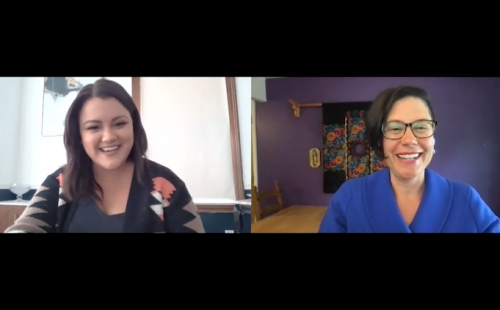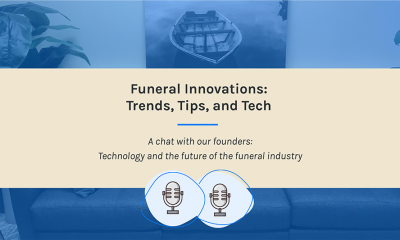Transcript From Our Video Interview with Alyssa Bouvy at SRS Computing.
Heather: Hi, everyone, and thanks for checking in with us at Funeral Innovations, trends, tips, and technology, where we chat with leaders in the profession to discuss marketing trends, business tips, and technology innovation. And we talk about how digital marketing helps you better serve your families. Heather Mills, I am the marketing director here at Funeral Innovations. And today we have with us Alissa Bouvy with SRS Computing. She’s the senior account executive there. So thank you so much for joining us.
Alyssa: Hi Heather! Thank you for having me.
Heather: You bet. Can you just tell us a little bit about yourself and what you do and a little bit about SRS?
Alyssa: Absolutely. I am a senior account executive at SRS, so I focus primarily on sales and I’ve kind of dabbled in little areas of the company everywhere else with marketing, ads, or website, stuff like that. I’ve been here for about seven years almost. So SRS computing, what we do is we’re basically all things ERP. So an ERP is an Enterprise Resource Planning. So it’s everything that you need to successfully manage a business. If you’re looking at the management software, your website, task/data entry, absolutely everything that you need.
Heather: Awesome. So you guys do ERP software. Let’s break that down a little bit. What are you what do you think are the three biggest problems that you see that funeral homes and cemeteries have? And how does SRS solve those?
Alyssa: Absolutely. So the first one I would say is probably just people not wanting to embrace technology. You know, that’s definitely something that we see a lot. So kind of getting over that biggest hurdle of embracing technology in the first place. I think that, of course, the pandemic really switched that mindset for a lot of people. But there are definitely some people that just still don’t see the value in it. But, you know, that just gets into the whole conversation of streamlining inefficiency. Whenever you have an ERP and a management software that your data is really available to you anywhere. So you can have everything you need at your fingertips and it all becomes totally portable. I think that’s a really big value that people see now, you know, and having a single entry solution also. So you’re not spending as much time typing the data and doing your forms in five different platforms or five different vendors and different portals. Everything all within this one system is really that single entry, the streamlined solution.
Heather: That’s great. That’s great. So are there still funeral homes out there using, like, paper and pencil for case management that’s still happening?
Alyssa: Absolutely. I actually see it or actually hear it, probably more often than you would think.
Heather: Yeah. Yeah. So tell me, why do you think that’s where people still are and what would you say to those folks?
Alyssa: Just because it’s comfortable. You know? A lot of people just aren’t really comfortable with change. Using pen and paper; it’s the simple solution. I know people probably think it’s the more economical solution maybe. But I think that they just really do need to, again, just find, you know, the value in having everything electronic. So whether it’s doing your data entry electronically, signing forms, we have a virtual files feature, which is a repository for documents, images. Having that on your phone in a Web-based platform to give you that portability, I think is the value that they’ll find with doing things, not on pen and paper.
Heather: Yeah, totally. And when it’s portable like that. Does that mean in a practical setting, how does that help people? They can work on it everywhere. They can pull up details and answer questions everywhere. People can hand it off among their staff.
Alyssa: Yeah, absolutely. So if you’re not at the funeral home for any reason, you know, if you’re on vacation and even just want to see what’s going on at the funeral home while you’ve been gone, you know, seeing how many cases you’ve had come in, seeing a to-do list and managing staff and managing expectations and making sure that things are still getting done whenever you’re not there, if you have tasks assigned out to you but you’re not in that location, then you can, of course, reassign them. For if you’re driving in on the road and someone needs to know how much do I owe on this contract? It’s all absolutely available right there. And it keeps you from being tied to the physical funeral home to answer every question whenever the phone rings.
Heather: I gotcha. Have you seen a transformation of someone who moved from paper and pencil to this online system and what a difference it made for them?
Alyssa: Oh, yeah, absolutely. Yeah.
Heather: Tell me about that.
Alyssa: I definitely have seen it before. You know, it’s kind of something that they’re probably hesitant to do. But also I think that that creates the best end user experience because they’re the ones that are probably the most excited about it because they know how much it can really change things. But having someone to see someone that happy that had benefited so greatly from the system, I think that definitely puts a smile on our faces.
Heather: Yeah, I bet. Tell me a little bit about the other products or services that SRS offers.
Alyssa: So we have a lot going on right now. We, of course, have our core management software for funeral homes, cemeteries, crematories. We also have a Web-based platform called Nine Online. We have electronic signatures, which is kind of our version of a DocuSign, but we had created it within the system just to create even more efficiency. And then it’s more economical without having to use a third party. We have phone apps. We have our own EPA. So our own credit card processing and electronic checks, ACH payments for cemeteries, of course. We have SRS websites. We have Tribute from insurance assignments. We also have coming out in I think about two weeks, maybe three, our own video platform for memorial videos as well.
Heather: Oh, nice. Tell me a little more about the e-signature and how that works. I bet that was widely adopted during the pandemic.
Alyssa: It was and the pandemic was actually kind of what prompted us to make our own. We used a third party that we just kind of had exported to and it worked great.
Heather: Was that DocuSign?
Alyssa: It was SignNow.
Heather: SignNow, okay.
Alyssa: Basically the same thing as a DocuSign, and it worked great. But whenever the pandemic had hit, we realized working with a third party, it took longer to set up documents to a third party. And this was an increase that clients needed these available for electronic signing right away, also being able to sign and then have that form automatically stay within the case file. That’s definitely something. Another reason why we build our own at the start of the pandemic. So it’s just a really streamlined process. Now that you send the document right from the case, you select whoever you want to send it to. They get an email to sign they had signed. Now they get all of their initials and signature prompts. As soon as they hit submit, that form is emailed automatically to the signer and automatically saved into the case file as well.
Heather: Terrific. So that really eliminates a lot of kind of chasing the paperwork.
Alyssa: It does absolutely. Yeah they don’t have to print and sign and scan and then send back even with using like a Docusign or something like that. There’s no importing and exporting the forms. So it saves a lot of time and a lot of extra steps.
Heather: That’s terrific. So you mentioned this a little bit already, but I often hear from funeral directors that they’re not huge fans of technology or they don’t want to connect with the technology. What would you say to those funeral directors from an SRS perspective or what would you hope that they would consider?
Alyssa: It still just goes back to they need to see the value in it. It’s hard to accept something if you don’t really see the value in using that piece of technology. So I think even to use it and see how much easier having this case management in a portable case management solution is, you know, they’ll see that they’re not tied to a server. They don’t have to run back to the funeral home and look through files in different file folders just to grab little bits of information. It’s all available right at your fingertips and on the go with you anywhere.
Heather: And is it is do people find it easy to learn once they’re in there and get a little training?
Alyssa: Yeah, absolutely. I think our system in itself also has a really user-friendly flow to it. You know, it was definitely made with funeral directors in mind and how their arrangement process goes. And it’s also customizable from there. So the training, we always definitely split out into kind of different staff groups also, which I think is really helpful. So if someone doesn’t need to learn anything with accounting, then they don’t have to sit in on that training. So we definitely like to customize that training process for the client and just making sure that everyone is really comfortable, they’re able to put in test cases and really get a hands-on feel for it before they actually go live. So everyone can make sure they absolutely know what they’re doing before they start using it on a daily basis.
Heather: Yeah, that’s terrific. And do you do training for all your clients with all the staff or how does that work?
Alyssa: Yeah, absolutely. So Luke is our project manager and he does basically all of our trainings that they are mostly done through a webinar, onsite training. If it’s requested, then we can do it. But all of our trainings will really kind of designated for all of the staff to make sure that they’re all on the same page.
Heather: That’s great. That really helps people get up and running.
Alyssa: It does, absolutely.
Heather: Yeah. And you mentioned a new product that’s launching here in the next few weeks. Will you talk a little bit more about that.
Alyssa: Absolutely, we have our own video tribute platform that we’re releasing, so we have a feature called Family Link, it basically allows the families to put in a lot of data entry and everything from home so they can upload images to save to the case file as well, whether it’s that picture you want to use for your website or for a prayer card. And then all those images that they’re uploading through Family Link say right into the case file and then can move right into our video tributes for them to create these really lovely and customized memorial videos as well.
Heather: Like a picture slideshow.
Alyssa: Absolutely. And they’ll be able to select the music and everything that they want to customize it.
Heather: That sounds wonderful. All in one spot is good.
Alyssa: Yeah, absolutely. That’s definitely the end goal. I think if you’re not using, you know, like I said, five different platforms to do five different things, you have this really all-in-one solution to manage everything for you. And it’s really easy to find things. It creates a lot of more streamlined and less confusion among all of their staff.
Heather: And when did SRS computing start? How long have you been around?
Alyssa: Since 1999.
Heather: Oh wow. Quite a while ago. Yeah that’s terrific. Awesome. So how can people get a hold of you to learn more, and get a hold of SRS?
Alyssa: So you can call 1-800-797-4861 or email me. It’s abouvy@SRScomputing.com.
Heather: Awesome. I do have two more quick questions. I just wanted to sneak that in there real quick. Tell me a little bit about trends you’ve seen in the past year and then we’ll ask you about predictions for this coming year too.
Alyssa: Yeah, I mean, a lot of the trends are stuff that we’ve talked about. You know, the electronic signing, our family link features, especially also, I think through an SRS website, we have online arranger’s that the family can start a full arrangement right on your website. I think that’s very helpful. And that all comes right into the case management as a case so that there’s no double entry. So I think using a lot of those kind of more portable and remote features has been a really big trend that I think will definitely continue moving forward. Of course, people are happy to meet in person again, but I still think those tools will absolutely be heavily utilized.
Heather: Yeah. Did you see that being used a lot more during covid?
Alyssa: Oh, absolutely, yeah. At the beginning of covid, we knew that our clients would need our family length feature, so we had actually just enabled it and gave it to everybody for the first six months to utilize.
Heather: That’s great. So what about predictions for the next six to 12 months, anywhere, anything you see happening or shifts you’re starting to see?
Alyssa: I think a lot still just kind of embracing the newer features that are available and kind of staying more on-trend versus not being as progressive as I know a lot of people tend to be. And they get very a lot of people just get comfortable with what they’re using and don’t even really see what’s available. So I think kind of being a little bit more progressive, that’s something that I think people are really going to look into.
Heather: That’s great. OK, and I have one more question. We ask everybody this. I don’t know what you did before you came to SRS and entered into the funeral profession, but what would you say is the biggest lesson you’ve learned from serving in the funeral space?
Alyssa: Honestly, I myself, I think I’ve learned the biggest value in an ERP and a management system, it’s something I think a lot of people don’t think of. Every industry will have some sort of management solution, whether you are an accountant or you go to a restaurant and they use something to manage. Everyone has a management system. So making sure that you find one that is really all-encompassing of everything that you need it to do. Another thing that I’ve learned with being on SRS is definitely the need to stay proactive and kind of expect the unexpected and make sure that you’re prepared that if you can’t go to work every day or you’re working from home and making sure that you have those jobs available.
Heather: Yeah, yeah. I didn’t even think about that work-from-home aspect during the pandemic. That an ERP like this would help with.
Alyssa: Yeah, yeah, absolutely. It was a struggle. So just making sure that you’re prepared and portable. I think that’s really important.
Heather: Yeah. Yeah. Well, thank you so much for joining us, Alyssa. We really appreciate you coming on today to talk about SRS computing and your ERP and what you guys do for funeral homes. And thanks to everybody who is watching. We’ll be posting this and all the regular spots: Our blog, on YouTube, and we’ll send it out an email. And if anyone has ideas that they’d like us to do as an interview. Feel free to reach out to me, Heather@FuneralInnovations.com. So thank you so much, Alyssa. I really appreciate it.
Alyssa: Thank you, Heather.
Heather: Have a great day, too.


